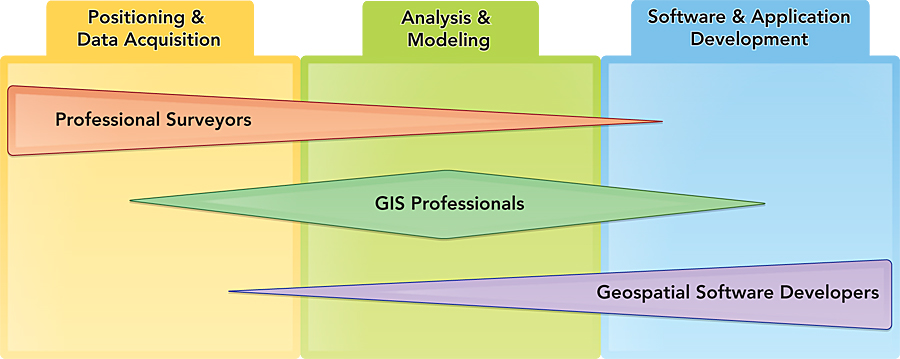The success of and demand for GIS work and the overlap between geospacial fields has made it necessary to define the GIS profession and to distinguish it from other related geospacial fields. DiBiase, director of education industry solutions at Esri, states that "to define something is, in a sense, to create it." If this is true, then defining the GIS profession is important to those of us who have stakes in the legitimacy of GIS as a career and as a skill.
DiBiase discusses the debate over whether the GIS profession should be considered a profession at all. DOLETA, the US Department of Labor Employment and Training Administration, is the authority that defines professions and qualifications. Despite the debate, DOLETA defined two GIS professions in 2009 and listed qualifications for these professions in 2010. For those considering making GIS a career, DOLETA offers a Geospacial Technology Competency Model (GTCM) which outlines the skills necessary to call oneself a GIS Professional, available here.
Those who believe the GIS profession is not legitimate argue that no mandatory certification program exists for GIS professionals. The GIS Certification Institute does provide certification and licensure for GIS professionals, but the certification is voluntary. However, a policy to mandate certification for all geospatial analysts is currently in the works and "the policy is to be in place at the National Geospacial-Intelligence Agency by September 2012." This policy will mark a huge milestone in the maturation of the GIS profession.
In addition the the skill set required of a GIS professional is the requirement to uphold the GIS Code of Ethics designed by Will Craig and officiated by the GIS Certification Institute. DiBiase also states the necessity for a moral ideal and offers his suggestion: "The GIS profession's moral ideal is to apply Geospatial technologies and spatial thinking to design sustainable futures for people and places everywhere." Lastly, DiBiase leaves us with a list of "seven things every GIS professional can do to strengthen our field."
DiBiase, D. (2012). Strengthening the GIS Profession. Retrieved from Http://www.esri.com/news/arcnews/summer12articles/strengthening-the-GIS-profession.html.


This is interesting because DiBiase only presents one side of the debate on professional licensee of GIS Analysts, the GISP. Right now GISP is voluntary meaning it is only a way to show off your GIS credentials, but does not provide you any special authority to make maps or create data. The move to make GISP a requirement make sense to some, but many are against the idea in the field. Some people see maps as a communicative instrument, and thinks license of mapmakers is in a way an infringement of the first amendment rights. In a way it could be seen as licensing a printing press, only allowing some to create books. Others make an argument that GIS create maps that can be destructive and manipulate the decision making process through false representations of information. Even so in that case GIS maps are like stats and the reader should always questions what they are presented. Some people feel that licensing will make a profession, and I have to admit I am considering getting a GISP, but sometimes I think that licensing just makes it harder for people to get into a field, giving them a hurdle to jump and limits who can do a certain job. Should GIS be treated like medicine or law? Should there be a special licence to do it? I am not sure...
ReplyDeleteThis is a controversial issue that has logical and rational arguments on both sides. I think the current voluntary GISP is an adequate compromise but I can see how some would be dissatisfied with this almost unnecessary certification/license. I can also understand why some would think that making a GISP requirement is somehow maintaining the credibility and reliability of GIS products, by preventing any hack from making a misleading/dishonest map, but this precaution almost reminds me of the push some state legislatures have recently had for stricter voter laws; it's addressing an issue that is largely imaginary. Creating this safeguard (or barrier) is unnecessary in my opinion because GIS as a profession is already viewed as an esoteric practice and therefore does not need any more barriers. This why I don't know if GIS will ever become egalitarian enough to allow for any Joe Blow to exploit. As long as GIS as a whole remains academic and scientific in their reception of new findings, the integrity of the profession will be just fine without mandatory licenses.
ReplyDelete